Teen Bipolar Disorder Treatment in Phoenix, AZ
Teen Bipolar Disorder Treatment
At Zenith Behavioral Health, we have developed a teen bipolar disorder treatment program at our residential facility in Phoenix, Arizona.
We offer a combination of different therapies and any needed medications. We include family therapy to help the entire family unit work together to help their loved ones make real progress in improving their mental health. Living with bipolar disorder can make life difficult for a teenager. It can impact their performance in school, part-time jobs, hobbies, and sports. This is why it is imperative to find the right teen bipolar disorder treatment center.

Learning Coping Skills for Anxiety
What Is Bipolar Disorder?
Bipolar disorder is classified as a mood disorder and can be fairly complex in how it manifests. It is also often misunderstood by both those who deal with it and their loved ones. When a teenager develops this condition, it becomes important that they receive specialized treatment for bipolar in teens.
When someone has bipolar disorder, they experience severe shifts in their moods that often affect their ability to function in their daily lives. For teenagers, this can mean it compromises their ability to do well in school, extracurricular activities, jobs, and relationships. Bipolar disorder cannot be cured, but it can be managed in a way that allows a person to greatly reduce their symptoms and enjoy a more even emotional life. Residential treatment centers for bipolar disorder can help adolescents gain a deeper understanding on how to mitigate the symptoms and learn how to manage their mental health.
Bipolar Disorder in Teens
While the average onset of bipolar disorder is in a person’s mid-20s, it can happen earlier. In fact, often the disease has already developed, but it takes years before it is properly diagnosed. Approximately one to two percent of people aged 7 to 21 have bipolar disorder. Those aged 18 to 29 have the highest rates of developing the disease.
Of additional concern is that about half of people with a mental illness, including bipolar disorder, also develop an addiction to drugs or alcohol. This is often a result of the individual attempting to self-medicate to control or block the symptoms that come with a mental health disorder.
Signs & Symptoms
Too often, a teenager who has bipolar disorder is not aware of what’s going on, nor does their family recognize the issue. While signs and symptoms of bipolar disorder vary per person, there are several that commonly occur. These include the following:
Hyperactivity: During manic and hypomanic episodes, a person often experiences hyperactivity. This can include difficulty sleeping, high levels of energy, and being very talkative. The person often has racing thoughts, cannot focus on one thing at a time, and moves from one task to another without completing one.
Feeling Depressed: Bipolar disorder can include feelings of depression during the depressive phase of the disease. This can include feeling sad, hopeless, and losing interest in the activities the person normally enjoys. For some, this can escalate to suicidal thoughts or feelings.
Hallucinations and Psychosis: Many people with bipolar disorder experience hallucinations, including hearing and seeing things that aren’t actually happening. Hallucinations may occur as symptoms of the disease or as part of psychosis.
Impulsive Behavior: When a teenager is in a manic episode, they may be prone to impulsive behavior, including making risky choices. They find themselves locked into the desire to satisfy a need to seek out thrills and are not able to consider the dangers that may be involved.
Delusions of Grandeur: Severe episodes can include a person falsely believing they are famous or possess superpowers. This typically happens during the manic and hypomanic phases.
Is My Teen Bipolar?
The above guide to symptoms of bipolar disorder can help a parent discover if their teenager has bipolar disorder. Having a medical expert or therapist give them an evaluation can also determine what’s going on and whether they can benefit from residential bipolar treatment or not. It can make sure the teenager has not previously received the wrong diagnosis, as sometimes bipolar disorder is confused for ADHD, depression, or other mental health disorders. It’s also important that parents not mistake their child’s bipolar disorder for simply being a teenager having mood swings or being overly dramatic.
How to Help a Teen with Bipolar Disorder in Phoenix, AZ
Bipolar in teens can be challenging but it is definitely treatable. Our Phoenix, Arizona based teen residential treatment can offer the most effective treatment for bipolar disorder because it provides a homelike facility for teenagers to live in while they work on learning to manage their mental health. Treatment will include multiple types of therapy, including individual, group, and family. Therapists work with young people to help them fully understand what bipolar disorder is about and effective ways to anticipate and manage the symptoms.
Medication can also play an important role in treating bipolar in teens. Treatment facility staff can help determine if meds are needed and which ones to use. During residential treatment, young people will learn to use healthy coping skills and other approaches that help them manage their disease for the rest of their lives.
About Bipolar Disorder Treatment for Teens
When treating bipolar in teens, therapy is one of the first lines of defense. Talk therapy, both individual and group, can help young people understand the full nature of their disease and how to handle it. They learn coping skills that help them both while in treatment and after they graduate from the program. Family therapy can also be beneficial because it helps the family understand what their loved one is going through and how to support them.
Bipolar Medication for Teens
Several types of prescription medications can be used to treat bipolar in teens. A doctor treating the teenager will make a full assessment of their condition in order to determine which medication to try. From there, they will monitor the results and any side effects that may occur.
Common medications used to treat bipolar disorder in teenagers include:
- Lithium: balances out neurotransmitters in the brain
- Anti-convulsants: decreases nerve activity and produces a feeling of calm
- Anti-depressants: used to treat the depression phase of bipolar disorder
- Atypical antipsychotics: produce a sedative effect
- Anti-anxiety medications: includes benzodiazepines and other medications
Contact Our Bipolar Disorder Treatment Center in Phoenix, Arizona
Living with bipolar disorder is challenging for anyone, but can be particularly difficult for adolescents. Transitioning from childhood to adulthood is difficult enough; adding in a mental health disorder can complicate the process. Zenith Behavioral Health in Phoenix, AZ, provides effective, compassionate treatment for bipolar disorder in teens aged 13 to 17. We employ the use of therapy and medication to help young individuals gain control of their mental health and feel more at peace in their lives.
Visit our admissions page today and find out how easy it is to get started on helping your teenager deal with his bipolar disorder.
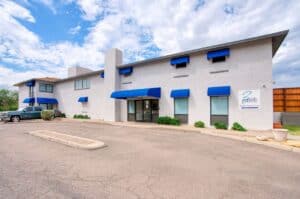
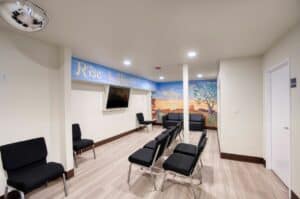
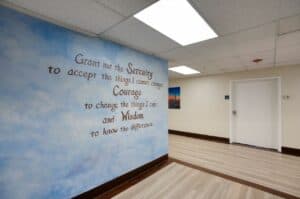
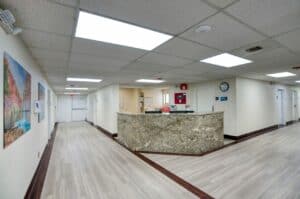
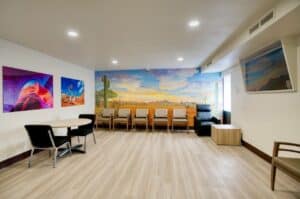
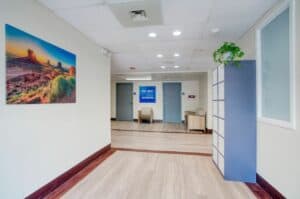
Recovery Resources
- Residential Treatment
- Admissions Process
- Frequently Asked Questions
- Insurance Verification
- Contact Us
Your Recovery Starts Here
Our team is ready 24/7 to help you or your loved one begin your recovery & take advantage of what life has to offer.

Teen Bipolar Disorder Treatment in Phoenix, Arizona
Our Detox & Mental Health Rehab Accepts Medicaid
Has your child’s life become ruled by bipolar disorder, and are you ready to help them take back the reins? Our adolescent residential treatment center in Phoenix, AZ, can help. Call (602) 847-9887 or fill out the confidential callback form below and learn how we can help your child live a life free from the symptoms of bipolar disorder.

